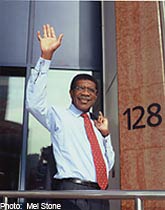Listening to Unite’s joint leader Tony Woodley addressing the union’s first annual policy conference in Manchester this morning, you couldn’t help but be struck by how much he wanted to impress on delegates the right – and wrong – ways of leading a union. And he picked on one of his favourite words in trade unionism: organising.
Woodley said: “Why should an employer listen to a union representing a minority of employees? Of course they won’t and they don’t. That’s why we need to push… for 100 per cent membership [in a given workplace]”.
“…So I make no apology for having our commitment to properly resourced organising written into our rule book. I know some may have doubts. Is it working? Is it cost effective? I would put that question, comrades, another way. After the experiences of the last 20 years or more of decline, can we afford not to do this?”
Most strikingly, he warned: “If this union ever, ever retreats from organising and it does go back into a comfort zone of sweetheart deals, managing decline, then this union will have wasted the vast potential that we’ve built in Unite.” Hardly comforting words. But decline is what Unite has to deal with: its membership has been falling for decades.
Woodley’s words require no inference. He is clearly proud of the approach he has backed in the T&G before it merged with Amicus to form Unite: that of relentlessly organising. Harvesting workers and raising the density of union membership in workplaces. In this approach he differs from fellow joint general secretary Derek Simpson, who has traditionally placed more of an emphasis on mergers and collaboration (the formation of transatlantic union Workers Uniting, an alliance of Unite and the US United Steelworkers, is very much his project). That’s not to say either man is right or wrong, or that their views are mutually exclusive (this blog takes no sides in the matter of Unite policy).
So Woodley’s message to conference in a nutshell was: I did it my way, it’s the right way, and don’t screw up the union after I’ve gone
Listening to Unite’s joint leader Tony Woodley addressing the union’s first annual policy conference in Manchester this morning, you couldn’t help but be struck by how much he wanted to impress on delegates the right – and wrong – ways of leading a union. And he picked on one of his favourite words in trade unionism: organising.
Woodley said: “Why should an employer listen to a union representing a minority of employees? Of course they won’t and they don’t. That’s why we need to push… for 100 per cent membership [in a given workplace]”.
“…So I make no apology for having our commitment to properly resourced organising written into our rule book. I know some may have doubts. Is it working? Is it cost effective? I would put that question, comrades, another way. After the experiences of the last 20 years or more of decline, can we afford not to do this?”
Most strikingly, he warned: “If this union ever, ever retreats from organising and it does go back into a comfort zone of sweetheart deals, managing decline, then this union will have wasted the vast potential that we’ve built in Unite.” Hardly comforting words. But decline is what Unite has to deal with: its membership has been falling for decades.
Woodley’s words require no inference. He is clearly proud of the approach he has backed in the T&G before it merged with Amicus to form Unite: that of relentlessly organising. Harvesting workers and raising the density of union membership in workplaces. In this approach he differs from fellow joint general secretary Derek Simpson, who has traditionally placed more of an emphasis on mergers and collaboration (the formation of transatlantic union Workers Uniting, an alliance of Unite and the US United Steelworkers, is very much his project). That’s not to say either man is right or wrong, or that their views are mutually exclusive (this blog takes no sides in the matter of Unite policy).
So Woodley’s message to conference in a nutshell was: I did it my way, it’s the right way, and don’t screw up the union after I’ve gone (Woodley is due to retire at the end of next year, a year after Simpson). Several officials close to him privately expressed support for this view.
He said a lot more of course, which this blog will return to. Alan Jones of PA has a good summary here.
. Several officials close to him privately expressed support for this view.
He said a lot more of course, which this blog will return to. Alan Jones of PA has a good summary here.
(from Tribune blog)


